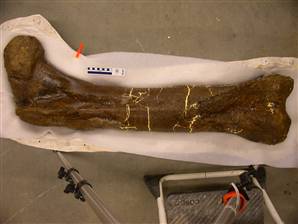What modern animals are dinosaurs most related to? Since the 90’s I have been convinced that modern birds are related to (and therefore at least partially the descendants of) dinosaurs. I got the idea from Michael Crichton’s books Jurassic Park and The Lost World – both good reads even today. I found his arguments pretty compelling, but there wasn’t much evidence back then.
Now a world renowned paleantologist and his collegues have done an analysis on collagen proteins extracted from a T-Rex leg bone. They can’t get actual DNA (à la Jurassic Park) as it is too fragile to survive the millions of years. However, proteins are created from the plans encoded in DNA, so they are also very useful for species analysis. The team had already used this analysis to show that mastadons (very similar to woolly mammoths) are related to modern mammals (obvious!).
The new analysis found that the T-Rex had most proteins in common with the modern chicken! There were also less significant matches with frogs and newts. The guys didn’t have much of the T-Rex protein to analyse so this is only a partial test – but they are back out there looking for more!
